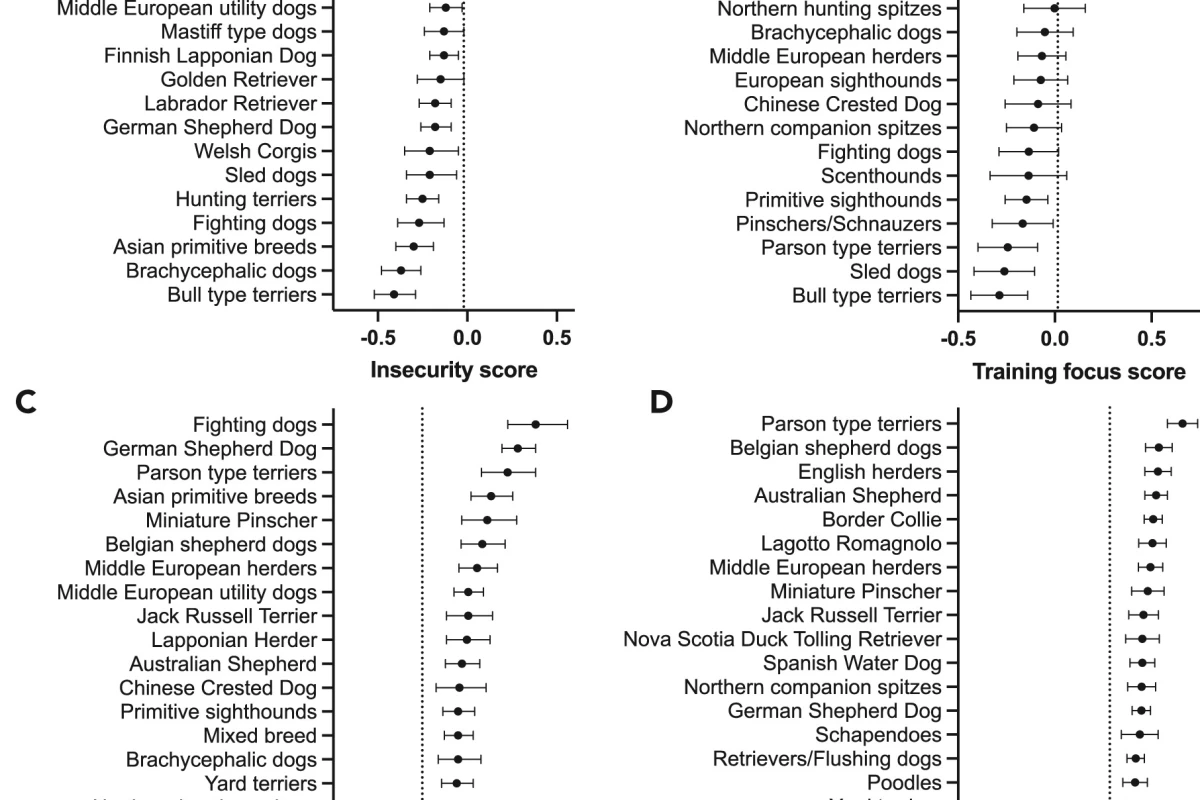The bond between humans and dogs has existed for thousands of years. Often, the decision to get a Rottweiler over a Chihuahua is made based on personality. A new study has found that while the breed is an important factor, a dog’s personality is determined by a complex interaction between genetics and environment.
A dog’s personality greatly influences the relationship between it and its owner, as well as the owner’s family members and other dogs. Mismatched personalities and unwanted behaviors such as aggression can cause a pet to be abandoned in a shelter or euthanized.
An animal’s personality traits are highly genetic, with heredity contributing 40% to 50%. But, as with humans, environmental factors also play an important role, especially in the dog’s early life. Dogs’ personalities have long been the subject of research, with previous studies showing that personalities differ between breeds. But a new study has found that breed is only a part of what determines a dog’s personality.
Researchers from the University of Helsinki in Finland collected a huge dataset of 11,418 dogs to examine the environmental and other factors contributing to personality.
“The breed of the dog is the most important determinant underlying personality differences,” said Milla Salonen, the lead author of the study. “All dogs are individuals, and all breeds have different traits, but the breeds differ in what kind of personality most dogs within each breed have.”
The dataset included more than 300 breeds grouped into 52 breed groups. Outside of this study, differences between breeds have not been studied comprehensively, say the researchers. Indeed, they say many of the breeds and breed groups included in this research haven’t been studied before.
The study examined various factors and their link to seven personality traits: insecurity, training focus, aggressiveness/dominance, energy, dog sociability, human sociability, and perseverance.
The researchers found that age was the most important variable as it was related to insecurity, training focus, energy, and dog sociability. While scores on training focus increased with age, insecurity, energy, and dog and human sociability scores fell compared with younger dogs. In all traits except dog sociability, sex was the least important variable.
They found that breed or breed group was the most important variable for determining aggressiveness/dominance, human sociability and perseverance. The most insecure was the Shetland Sheepdog (Sheltie); the least insecure were Bull-type terriers. Parson-type terriers had the most energy, whereas livestock guardian dogs were the least energetic. Perhaps because of their high energy levels, Parson-type terriers lost out to Labrador Retrievers in terms of training focus.
Regarding aggressiveness/dominance, the researchers found a significant difference between fighting dogs, the top scorers, and Golden Retrievers, the lowest-scoring breed. German Shepherds were second in aggressiveness after fighting dogs. Bull-type terriers had the highest score for human sociability, and livestock guardian dogs had the lowest. As far as sociability between dogs, the Finnish Lapponian won; the Border Collie had the lowest score.
If you're keen to see where your dog – or potential dog – stands insofar as personality traits are concerned, check out the charts below.

Of all the environmental factors looked at in the study, the researchers found that socialization during puppyhood – when the pup is between seven weeks and four months old – was the most significant. A large number of socializations during that time were associated with lower insecurity and aggressiveness/dominance, and higher training focus, human and dog sociability. The largest difference between poor socialization and high socialization of puppies concerns insecurity.
“Our findings indicate that new owners should familiarize their puppies as much as possible with unfamiliar people, places and animals,” Salonen said. “Of course, socialization must always be done on the puppy’s terms, which means that the puppy must not be forced into frightening situations.”
The study’s findings show that a dog’s personality comes from a complex interaction between genetics and environment.
“The associations of breed and age of the dog with personality traits were more extensive than environmental factors,” the researchers said. “This was hardly surprising, as the environmental variables mostly considered the current environment of largely adult individuals … Overall, our results show that personality traits are complex and are likely influenced by the genetic background of the individual and life experiences.”
The study highlights the large impact humans have on a dog’s personality and well-being. But, say the researchers, it’s important to remember that owners can help shape that personality by socializing them well as puppies.
The study was published in the journal iScience.
Source: University of Helsinki






